- Home
- Nick Carter
Assassin: Code Name Vulture Page 2
Assassin: Code Name Vulture Read online
Page 2
I caught a movement in the corner of my eye and turned toward one of the chimney entrances of the termite mound. A small, bright green snake glided out of the opening a short distance from my left arm and seemed to stare at me. I jumped away. I didn't know that snakes took up residence in termite mounds. This one was a green mamba, one of the world's three steps snakes. If bitten, the victim would be able to put about three steps between himself and the reptile before its venom would kill him. The mamba, out of striking distance for the moment, slithered into an adjacent chimney.
I stumbled over to the wreckage as my pulse subsided. I looked around for a moment and found a sharp sliver of metal about a foot long on the ground. One end of it was very sharp. Ripping off a piece of wooden molding, partly charred, from a section of fuselage, I broke it into two pieces of equal length and splinted the wide end of the shard, tying the sticks on with my handkerchief to make a handle for my makeshift knife. I stuck the crude weapon into my belt and, without looking back at the wreck, started off toward the trees.
It was difficult just to walk in the bush country. The tall grass and the thornbushes pulled at my clothing and raked my flesh, grabbing at me and holding me back. A hornbill shrieked at me from a nearby acacia. I found myself calculating the odds against survival. There are a hundred ways to die out there, and none of them are pleasant. In that grass, a man can walk right into a lion before he sees it. But it is the small creatures that generally cause the most trouble: snakes no bigger around than a man's finger and scorpions and ticks that burrow deep under the skin. If you find and drink the water, you may be plagued with liver flukes and other parasites that eat at a man from inside. And if you avoid these, you may still be attacked by the mosquitoes that carry yellow fever and malaria.
When I finally arrived at the trees, I found only the remains of a waterhole. The place had dried up. There was thick, black mud at the center and the hoofprints of many animals at the perimeter of the area.
I leaned against the green trunk of the nearest tree and rested in the shade. I had wasted my time and energy in coming here. The direction to the nearest village, the one that Salomos had mentioned in the plane, was at ninety degrees to the course that had brought me to this place. The walk in the boiling sun had weakened me even more. My mouth was like tanned leather. I remembered the thermos with its cold water that Salomos had brought aboard the plane. I had seen its crushed cylinder in the wreckage; its contents had boiled away in the fire. I tried not to think of the tropical sun overhead, or of the thirst in my throat, and began walking.
It must have been a couple of hours later when I came to the realization that I could go no farther without rest. My legs were trembling with weakness, and I was drawing air into my lungs in long rasping breaths. I saw the dead stump of a tree, part of it in the sparse shadow of an adjacent thornbush, just a few yards ahead. I slumped heavily to the ground and propped myself against the stump. Just the act of sitting down, the relief from the physical exertion of walking, was satisfying.
My eyelids closed, and I ignored the aching in my body. I tried to forget the small muscles twitching in my thighs and the insect bites on my face and arms. I needed rest and I was going to get it. To hell with anything else.
A sound came from the bush.
My eyelids fluttered open. Had I been mistaken? I peered into the tall grass, but I saw nothing. It must have been my imagination. I closed my eyes again, but the sound was repeated.
This time my eyes opened more quickly. There was no doubt of it; it had been the sound of a human voice. I strained my ears and heard a twig break.
"It was something!" I muttered.
Then the sound became more constant and more distinct. Two men were talking in what appeared to be some bush dialect that I had never heard.
"Hello!" I yelled with the last of my strength. "Over here!"
In another moment I saw their heads moving toward me above the grass. Black heads and khaki shirts. As they saw me, their voices increased in volume, and one of them pointed.
I relaxed a little. I had been closer to civilization than I had thought. There must be a village somewhere nearby, or at least a road. The men were emerging from the grass and staring at me. They were tall, slim, and grim-faced.
"Hello," I said. "Do you have water?"
The men looked at each other, then back at me. They came and stood over me. I didn't try to get up. "Water," I said.
They were both dressed very shabbily in western clothes and wore makeshift sandals. The taller of the two pointed at my feet, and in a moment he was bending down and untying my shoe. Before I could ask what he was doing, he had taken it off and was holding it up to his companion. The one holding my shoe up for inspection had a large, wide scar that ran diagonally across his face. The other wore a small mirror in the stretched lobe of his right ear. Both carried pangas, machete-type knives, in their belts.
The tall one spoke to the other, and I realized he was speaking Swahili. "Mzuri sana," he said, grinning, referring to my shoes. He continued in Swahili. "This is my lucky day."
"Listen to me," I began weakly.
They ignored me. The tall man bent and untied my other shoe. I tried to pull my foot back, but he gave me a vicious look and yanked the second shoe from it. He kicked off his own shabby sandals and jammed my shoes onto his feet, not bothering to tie the laces. "Sawasawa!" he said to his companion, ignoring me completely now.
I realized, quite abruptly, that these men were not going to be my saviors. And it occurred to me that I just might be worse off than before their arrival, if I was counting on survival.
"The shoes fit well." It was the tall one.
The other one was not enjoying the situation. "How is it that you assume the shoes are yours? Did we not come on him together?"
"It was I who saw him first," the tall one said. "You may have his trousers. If he has a pouch we will share its contents."
"It is not right that you take the shoes for yourself," the mirror-decorated one muttered.
The tall man turned to me. "Remove your pants," he commanded, still in Swahili. His eyes were yellow with red streaks shot through them and there were delicately etched scars on each cheek that were not noticeable at first because of the large scar.
My hand rested on the handle of my makeshift knife, hiding it from their view. It seemed that I would have to use it. The one with the stretched earlobe was taking the panga from his belt. There was little doubt of their intentions. They could not rob a white man of everything he had and then let him live.
"All right, I'll take my pants off," I said. I had regained some strength, but I did not want to show it. "But I must get to my feet." I extended my left hand to the tall one.
He looked contemptuously at it for a moment and then grabbed at my forearm roughly and jerked me to my feet. At the instant I came off the ground, I pulled my metal-shard knife from my waist and shoved it hard into the African's mid-section.
His eyes saucered in surprise as the razor-sharp metal slid through flesh and muscle. His right hand went automatically to the handle of his panga, but that was his last voluntary act. He grunted out an ugly noise and slid to the dust at my feet.
Mirror-ear stared wide-eyed at his fallen companion for a brief moment. Then he made a wild sound in his throat and swung the panga that he had just drawn.
I ducked backwards. The big blade sizzled past my face cutting the air audibly and just missing my head and shoulder. If I hadn't moved, it would have decapitated me. When I had avoided the panga, however, I had fatten to the ground. The African now moved over me and swung the knife again, and the glistening, curved blade whistled through the air toward my neck. I rolled quickly to my right, and the blade thudded the hard clay. While my attacker recovered his balance, I turned and kicked out savagely at his leg. I heard bone snap somewhere. He fell to the ground near me with a loud cry.
If I had been my usual self, that would have been the end of him. But I was slow to follow up the ad
vantages that I had created. As I got to my knees, the African was already standing and a look of desperation came over his face. He swung at me again, and this time the arc was wide. The blade slit the sleeve of my shirt as it sliced downward. I jabbed out toward him with my shard and made a shallow laceration on his chest. He gave another grunt and swung the panga at my head as I fell back against the stump. The force of the swing caused Mirror-ear to lose his balance and fall across my right arm. I grabbed the back of his ragged collar with my left hand, pulled his head back, and drew the metal shard across his throat.
Blood spattered onto my face and chest as the African gasped loudly and reached convulsively for his severed throat. He fell face down onto the stump, still clutching at his throat, and then he rolled off onto the hard ground, motionless.
Breathing hard, I slumped back on one elbow. I was angry to have wasted important energy needed for survival on this fight, but I was grateful that I was still alive. When I had made a mental note of the dangers of the bush back at the wreck, I had forgotten one: man. Man, it seemed, was always at the top of the list. If you ignored that one factor, you might be dead before the bush could kill you.
At least I had one fact to go on in this situation. These men had come from a westerly direction, rather than the southwesterly one which I had taken. It just might be that they had come through a village or had left a road back there somewhere. The same could be said of the direction in which they were headed. I rose weakly and chose the westerly direction.
The hot African sun was slanting down in the sky when I gave out again. I collapsed in the tall grass, wondering whether there was still any real chance of making it. I needed water badly. There was no longer any feeling in my tongue and mouth. I lay there and watched a scorpion crawl slowly past me in the grass. I didn't know whether I could move if it attacked, but it did not seem to take notice of me. In a moment it was moving away. I grimaced and envied it, for it had no problem of survival, at least not at the moment. It seemed a bit ironic that its species had been crawling around on the planet's surface for over four hundred million years, long predating the dinosaurs, and that it would probably be on earth well after man was gone. It didn't seem fair somehow, but then I was prejudiced.
As I lay there, another sound assailed my ears. It was a distant humming, not unlike that of the flies earlier. But this sound quickly grew in volume and became recognizable as that of a car engine.
I propped myself up and cocked my head to hear. Yes, it was a vehicle of some kind. I rose unsteadily and headed toward the sound. I could see nothing but the grass and occasional trees. But the noise was getting closer with every second.
"Hey!" I yelled out over the grass. "Hey, over here!"
I stumbled and fell. Getting groggily to my feet once more, I staggered forward again. In a moment, I saw it — a Land Rover, dusty and scratched up, bumping along a secondary road that was nothing more than a track through the grass. The Rover, an open vehicle, was occupied by two men who had not seen me, for it approached the nearest point to me on the road and continued on.
"Hey!" I yelled.
I stumbled awkwardly through the grass and finally made it to the road. I yelled again when I got there. I started drunkenly after the vehicle, but fell on my face.
I lay there swearing aloud and feeling desperation rise in my chest. That car might be my last chance for survival.
Then I heard the Rover slow and brake to a stop. I tried to get up to see what had happened, but my strength was gone. I heard the engine idling a moment, then the Rover was in first gear again, swinging back around on the road and heading toward me. They had either heard me or seen me after all.
In just seconds the car stopped near me, the engine was cut, and I heard two men speaking in British accents.
"Good Lord, it's a European."
"What's he doing out here in the bush on foot?"
"Maybe we ought to ask him."
Soon there was cool water running into my mouth, spilling onto my dirty shirt front, and I could feel my tongue again.
"Good God, man, what happened?"
I focused on the two beefy faces leaning over me. They were middle-aged, white Rhodesians, probably gentlemen farmers out for a day in the bush.
"A plane crash," I answered. "I walked away from it."
As they hoisted me into the Rover, I knew I had made it. But I could not forget the body of Alexis Salomos being devoured by hyenas out there because of somebody in Athens. I hoped that David Hawk would let me dig into what was happening in the Apollo Building to find out whether Adrian Stavros was really in Brazil as everybody thought Because if any of Alexis Salomos' theory were true, there was trouble ahead of a kind that AXE had not seen in a good, long time.
Three
"You don't look too good, Nick."
David Hawk, director of America's super-secret AXE agency, was holding a stubby cigar between the fingers of his right hand and leaning forward on his wide mahogany desk. We were sitting in his office at AXE headquarters which was cleverly hidden in the rented space of the Amalgamated Press & Wire Services on DuPont Circle in Washington.
I regarded him with a wry grin. "They wanted me to stay a while longer in that Salisbury hospital. But you know how quickly I get bored. If I'm pale, it's because I need the sun and a good sirloin steak. What do you think of Salomos' story?"
Hawk puffed on the cigar and blew a smoke ring toward me. He looked small and thin sitting behind the big desk, with his rumpled, gray hair and his Connecticut farmer's face. But I knew that the frail look was deceiving. He was a dynamo.
"It frightens me a little," he said. "It also frightens me that you damn near got yourself killed between assignments. I never saw a man who found trouble so easily."
I shrugged my shoulders. "Salomos was a friend. Of mine and of AXE. He went out of his way to help us find Borisov that time, remember?"
"Yes, I remember," Hawk said soberly. "Well, your Rhodesian escapade is over, so we'll drop it. As for the possibility that Adrian Stavros might be planning a coup against the Greek government, I wouldn't put it past him."
"Does he still own the plantation in Brazil?"
"According to our sources, that's still his headquarters. We don't have a recent report." Hawk leaned back in his big leather chair. "If that was really Stavros that your friend saw coming from the Minourkos penthouse, we're definitely confronted with an interesting situation. Dreams of running a whole country fit in very nicely with what we've learned about him."
Hawk studied his bony knuckles. "Adrian Stavros was always a neurotic personality, perhaps psychopathic. Besides running a successful smuggling ring in Brazil that the government there has been unable to break, he has also made a business of political assassination, the most recent believed to be the killing of the Israeli official Moshe Ben Canaan."
"Then I take it AXE is interested in Alexis Salomos' story," I said.
"I'm afraid we have to be. And I suppose that because you considered Salomos a friend, you'd like to have the assignment."
"Yes sir, I would."
Hawk stubbed out the cigar in a nearby ashtray. "My first impulse is to say no and give the case to another man. You know how I try to avoid an agent's personal involvement in an assignment."
"It's important to me that Alexis' killer doesn't go free," I said quietly.
"All right. You can handle this one. But be especially careful, Nick. The way to start on this, I think, is to go to Rio and talk to the CIA man there. Find out if Stavros is outside the country and where he's been spending his time. Then if your leads take you to Athens, go there. Just keep me informed."
"Don't I always?" I grinned.
"Well, you sometimes tend to forget that there are people back here at their dull desk jobs whose responsibility it is to run the show." His voice had taken on that truculent tone that it sometimes did when he spoke of protocol and chain of command. "If you need help at any point along the way, ask for it. That's what we're here
for."
"Of course."
He opened a desk drawer and pulled out an envelope. His eyes avoided mine. "Anticipating your request and my eventual concession to you, I had the foresight, if not the wisdom, to purchase your ticket."
I smiled. "Thanks." I reached across the desk and took the envelope.
"You'd better wait to see how this all comes out before you decide whether I've done you any favors," Hawk replied.
The next evening I boarded the Pan Am flight to Rio de Janeiro. I had rested all day and was feeling pretty much my old self again. The flight was uneventful, but I kept thinking of that other one in the small Mooney aircraft when Salomos showed me the veldt, of the trouble and the crash landing, and of the way Salomos' corpse had looked in the hot sun.
I arrived in Rio the next morning and checked into the Floriano Hotel near the Copacabana Palace. It was just a block from the beach, and it had the flavor of colonial Brazil. The room had a ceiling fan and louvered doors, and the narrow balcony gave a small view of the sea.
It was hot in Rio. All the Brazilians who could get there were at the beach, and most of them must have been at the Copacabana area near the hotel. Anticipating the heat, I had brought a tropical worsted suit along. I showered at noon, donned the lightweight suit over Wilhelmina, my Luger, and Hugo, the sheathed stiletto, on my right arm, and went for lunch at one of my favorite small restaurants, the Chale at Rua da Matriz 54. This restaurant had been a colonial home and was still furnished with valuable antiques and paintings. Negro servants waited tables and tended bar. I ordered a churrasco mixto, which consisted of chunks of beef and pork in vegetables, and passed up the usual chopp, an excellent local draft beer, for their very fine Grande Uniao Cabernet wine. But I had just started the meal when I saw the girl walk in and seat herself at a nearby table. She was tall and svelte, and her mane of flaming red hair made her milky white skin appear even paler. Her dazzling green mini-dress made a striking contrast with her hair and revealed a good portion of long, perfect thighs, and above the waist, a breathtaking cleavage. She wore green shoes that matched the dress and green bracelets on her left arm.

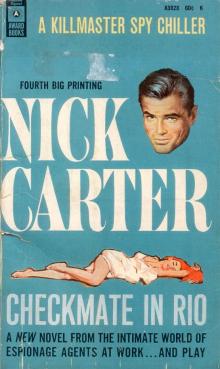 Checkmate in Rio
Checkmate in Rio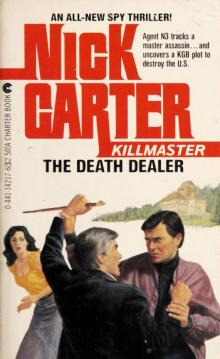 The Death Dealer
The Death Dealer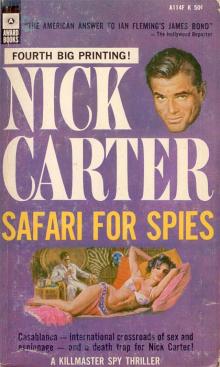 Safari for Spies
Safari for Spies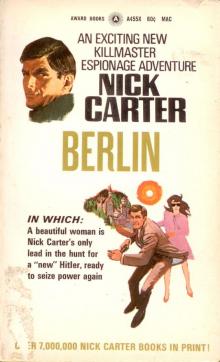 Berlin
Berlin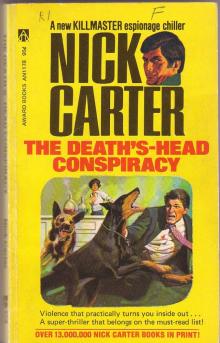 The Death’s Head Conspiracy
The Death’s Head Conspiracy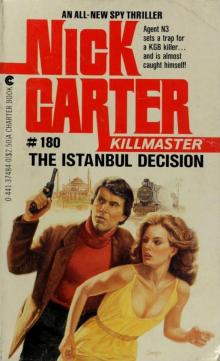 The Istanbul Decision
The Istanbul Decision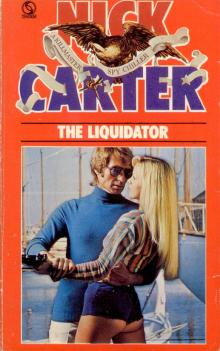 The Liquidator
The Liquidator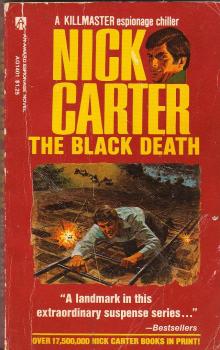 The Black Death
The Black Death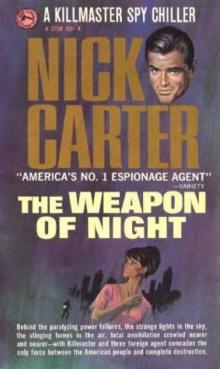 The Weapon of Night
The Weapon of Night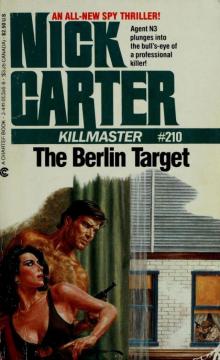 The Berlin Target
The Berlin Target Temple of Fear
Temple of Fear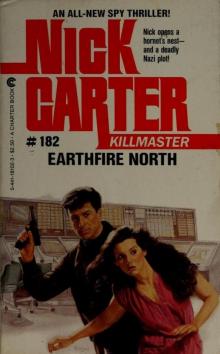 Earthfire North
Earthfire North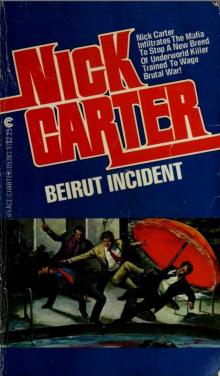 Beirut Incident
Beirut Incident White Death
White Death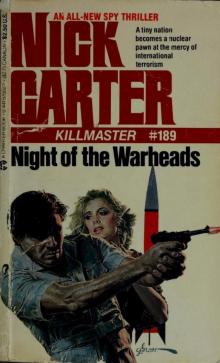 Night of the Warheads
Night of the Warheads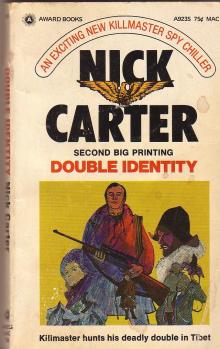 Double Identity
Double Identity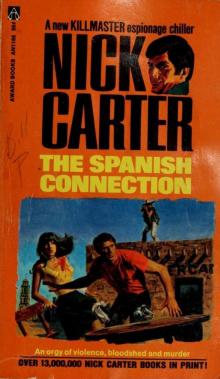 The Spanish Connection
The Spanish Connection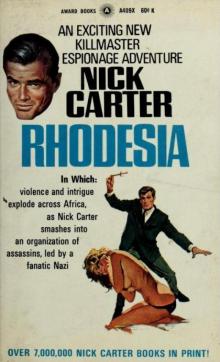 Rhodesia
Rhodesia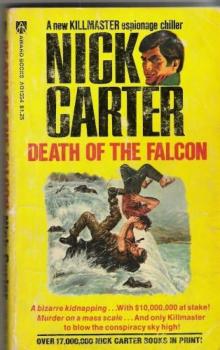 Death of the Falcon
Death of the Falcon The Executioners
The Executioners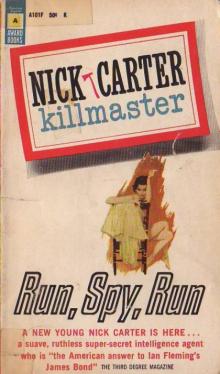 Run, Spy, Run
Run, Spy, Run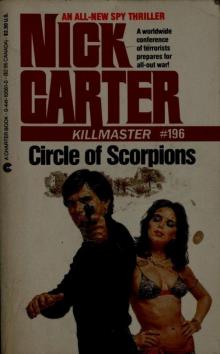 Circle of Scorpions
Circle of Scorpions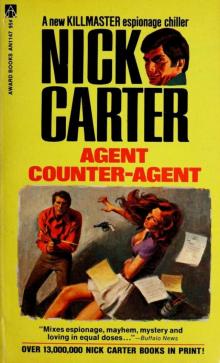 Agent Counter-Agent
Agent Counter-Agent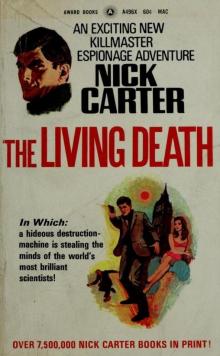 The Living Death
The Living Death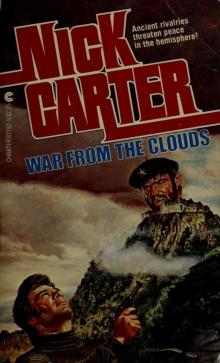 War From The Clouds
War From The Clouds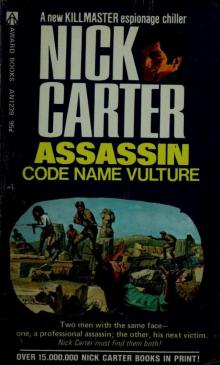 Assassin: Code Name Vulture
Assassin: Code Name Vulture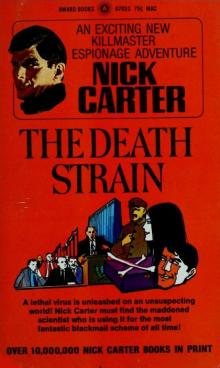 The Death Strain
The Death Strain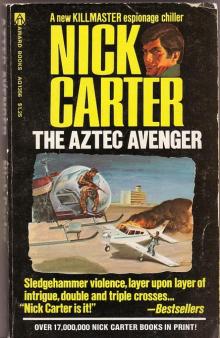 The Aztec Avenger
The Aztec Avenger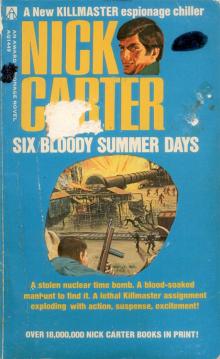 Six Bloody Summer Days
Six Bloody Summer Days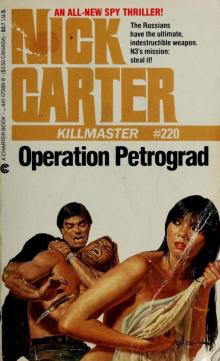 Operation Petrograd
Operation Petrograd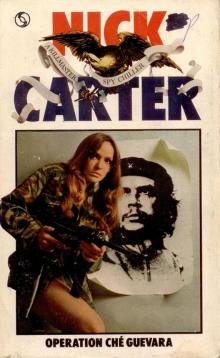 Operation Che Guevara
Operation Che Guevara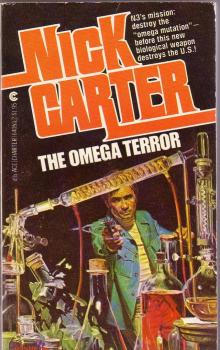 The Omega Terror
The Omega Terror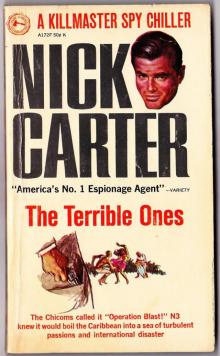 The Terrible Ones
The Terrible Ones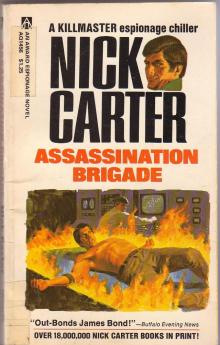 Assassination Brigade
Assassination Brigade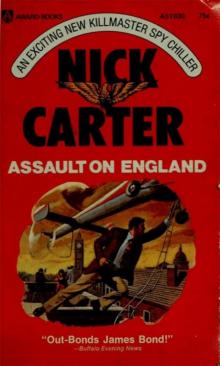 Assault on England
Assault on England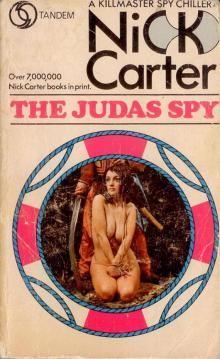 The Judas Spy
The Judas Spy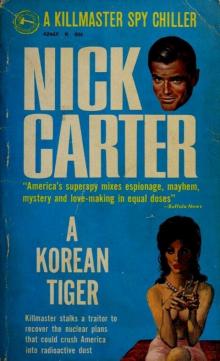 A Korean Tiger
A Korean Tiger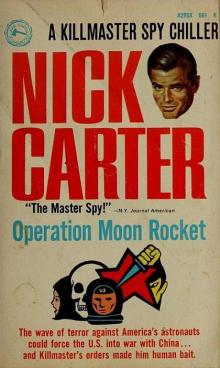 Operation Moon Rocket
Operation Moon Rocket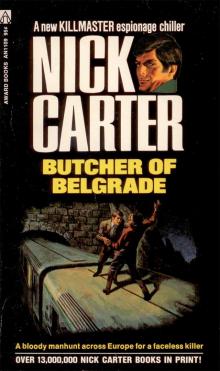 Butcher of Belgrade
Butcher of Belgrade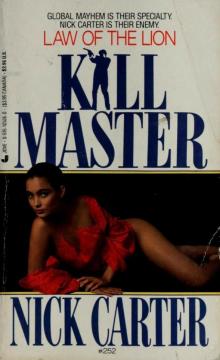 Law of the Lion
Law of the Lion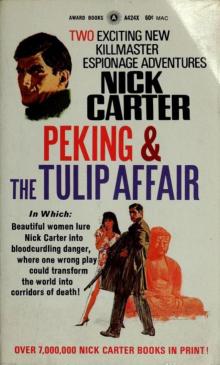 Peking & The Tulip Affair
Peking & The Tulip Affair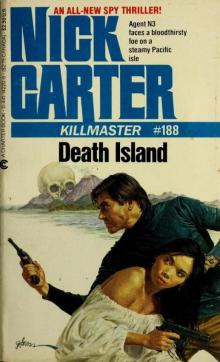 Death Island
Death Island The Jerusalem File
The Jerusalem File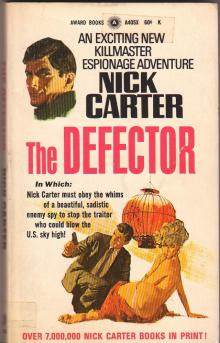 The Defector
The Defector The Fanatics of Al Asad
The Fanatics of Al Asad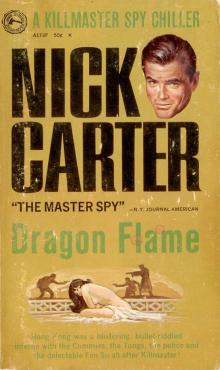 Dragon Flame
Dragon Flame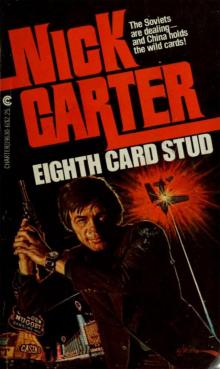 Eighth Card Stud
Eighth Card Stud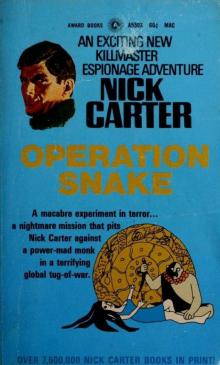 Operation Snake
Operation Snake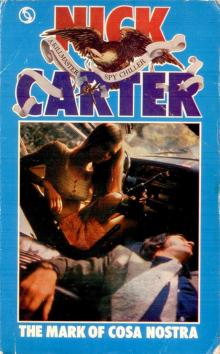 The Mark of Cosa Nostra
The Mark of Cosa Nostra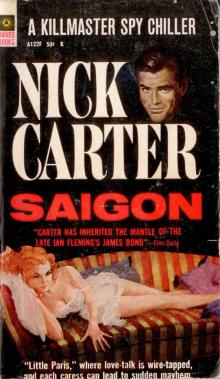 Saigon
Saigon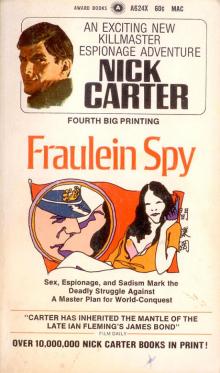 Fraulein Spy
Fraulein Spy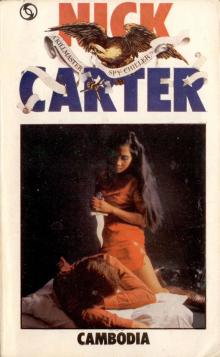 Cambodia
Cambodia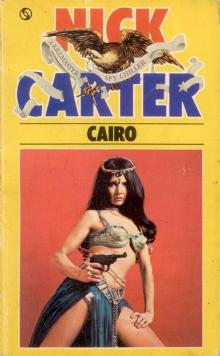 Cairo
Cairo